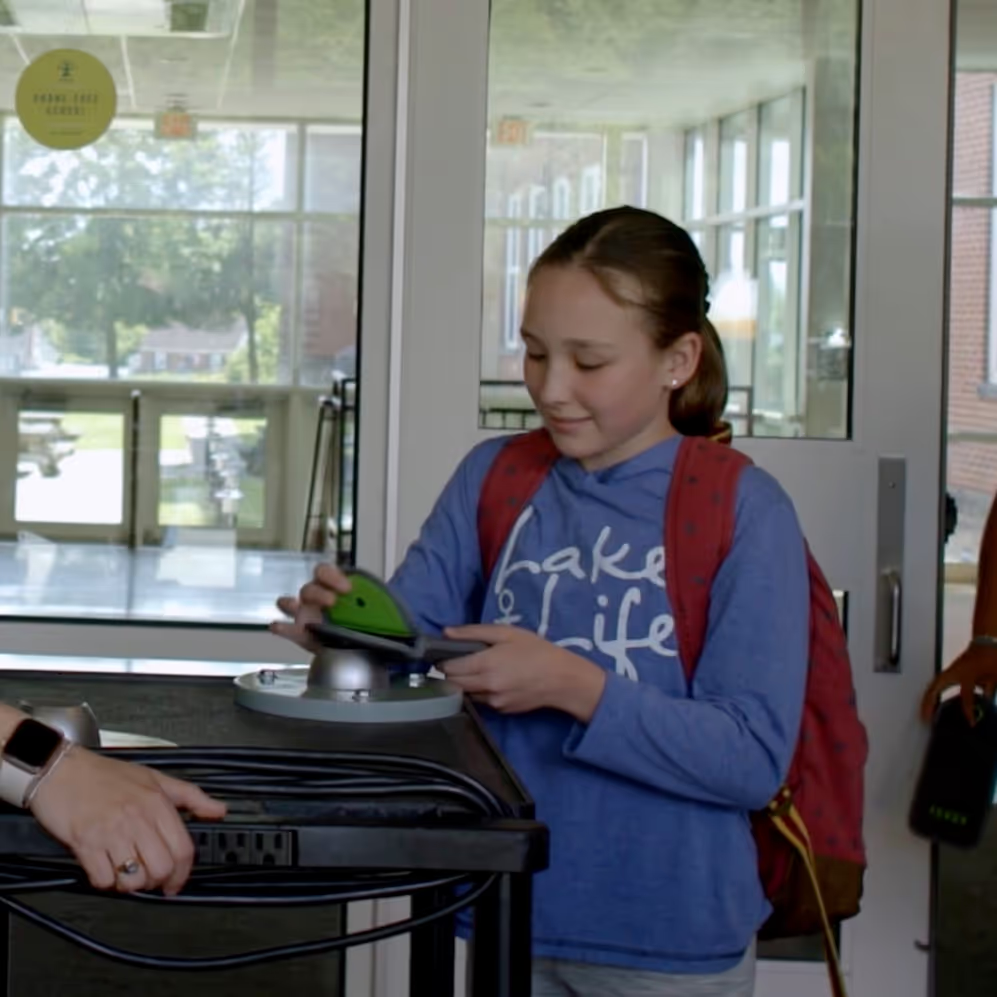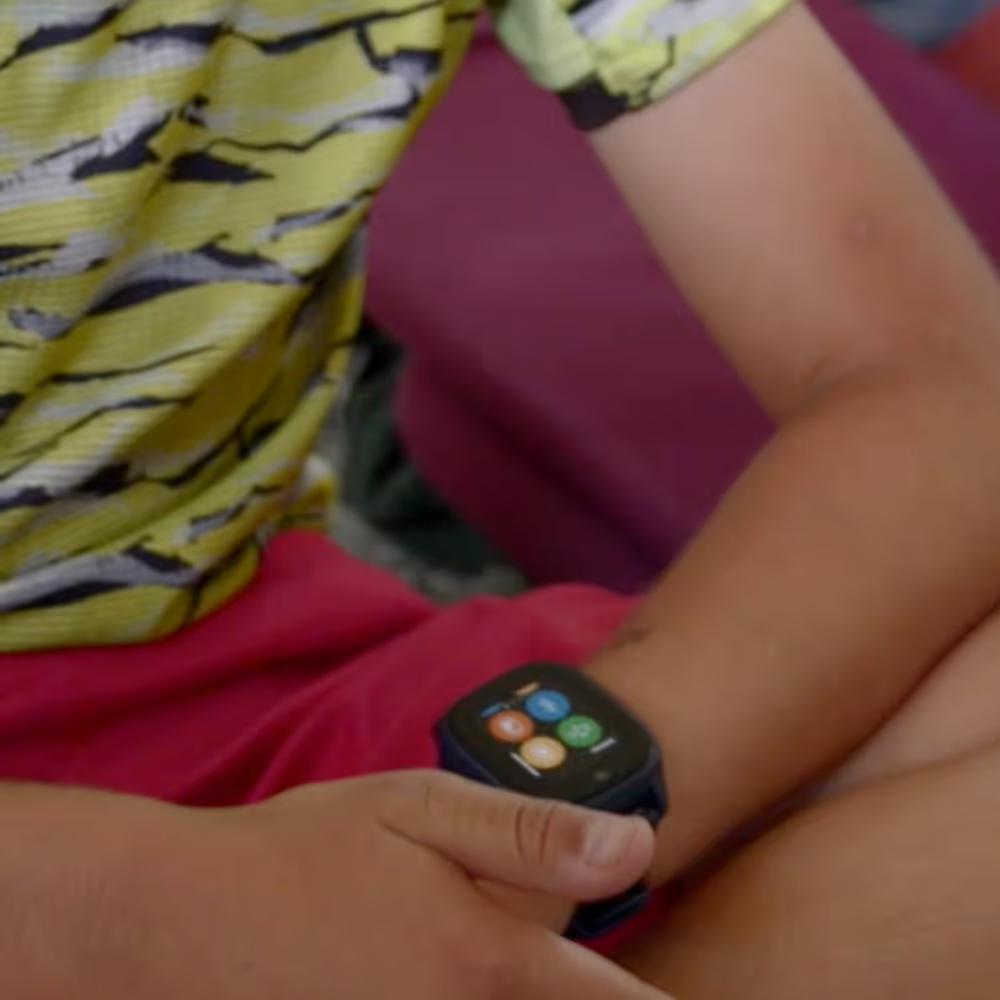


Your kid is at school...and something pops into your head that you want to tell your child—plans for dinner have changed, plans after school changed, the doctor appointment tomorrow is confirmed, you love them, etc. What do you do? Do you send the text right when the thought comes, or hold off?
I have started to change my practice around this. Awhile back I was more apt to text right away. Given the lenient phone policies of my teens’ schools in the past, I knew they were receiving snaps and texts from peers all day long, so why would my occasional text make a difference?
Then something happened. My daughter’s high school changed its policy this year to away-for-the day during class time, and I started thinking differently. The school is working hard to have teens put their attention toward school—teachers are doing an excellent job of requiring phones away in classes (yes, it is working). So even though students can check devices at lunch (and passing to next classes which they do not do as much as you might think they would), I realized I no longer wanted to add to the things Tessa would feel she had to think about or respond to.
Also, I am a big believer in working hard to teach my daughter and son, and myself, to continually be a better planner. So the less we rely on the phone as the escape route for changing plans, the more we work together to get our plans organized outside of school time. So I have really started to “HOLD THAT TEXT.”
This idea is also important in schools that have 100% Away For The Day policies, where phones are put in lockers or backpacks for the whole day. A text during the school day implies we want them to see it, even if we know we don’t expect them to see it until after school. Why give them these mixed messages?
HOLD THAT TEXT is not only about when kids are at school. After a talk I gave recently to a conference of health care providers, a woman came up to me and said how, now that she has joint custody of her kids with her ex-husband, her time with them is that much more precious. So she has ensured she gets at least one hour of alone time with each of them a week, like going out for an ice cream. And the kids know that during this time, she will basically only answer texts and calls from the other kids. And the kids also know they don’t like when their time is interrupted, so they all work to not text mom during those times. Thus they are learning to HOLD THAT TEXT.
I must confess that the hardest part of HOLD THAT TEXT is that I truly fear I will lose the thought completely if I do not quickly do it, because my “working memory” (a psychology term) is not working as well as it use to. So I am getting better at using the Notes messages on my phone to dictate the idea and then at the same time set an alarm to go off after school hours. That way I remember to text her. I know, I know, this seems like a lot of work versus just sending her the text. But holding the text feels good each time I do it because I believe deeply in the idea that we have times away from our phones, just like when I worked in hospitals and needed a pager, and enjoyed the times that I could take a rest from the pager.
We would love for you to share this TTT any way that works for you, whether that’s on social media or via a newsletter. If you want to send it out in your newsletter we just ask that you credit us and link to our website, and let us know at lisa@screenagersmovie.com.
HOST A SCREENING to help spark change.
FIND EVENT LISTINGS
Do you organize professional development in schools? We now have a 6-hour, 3-part training module. Request more information here Professional Development.
Stay in touch with the Screenagers community on Facebook, Twitter and leave comments below.
Learn more about showing our movies in your school or community!
Join Screenagers filmmaker Delaney Ruston MD for our latest Podcast

Learn more about our Screen-Free Sleep campaign at the website!
Our movie made for parents and educators of younger kids
Learn more about showing our movies in your school or community!
Learn more about showing our movies in your school or community!
Join Screenagers filmmaker Delaney Ruston MD for our latest Podcast

Learn more about our Screen-Free Sleep campaign at the website!
Our movie made for parents and educators of younger kids
Join Screenagers filmmaker Delaney Ruston MD for our latest Podcast
As we’re about to celebrate 10 years of Screenagers, we want to hear what’s been most helpful and what you’d like to see next.
Please click here to share your thoughts with us in our community survey. It only takes 5–10 minutes, and everyone who completes it will be entered to win one of five $50 Amazon vouchers.
Your kid is at school...and something pops into your head that you want to tell your child—plans for dinner have changed, plans after school changed, the doctor appointment tomorrow is confirmed, you love them, etc. What do you do? Do you send the text right when the thought comes, or hold off?
I have started to change my practice around this. Awhile back I was more apt to text right away. Given the lenient phone policies of my teens’ schools in the past, I knew they were receiving snaps and texts from peers all day long, so why would my occasional text make a difference?
Then something happened. My daughter’s high school changed its policy this year to away-for-the day during class time, and I started thinking differently. The school is working hard to have teens put their attention toward school—teachers are doing an excellent job of requiring phones away in classes (yes, it is working). So even though students can check devices at lunch (and passing to next classes which they do not do as much as you might think they would), I realized I no longer wanted to add to the things Tessa would feel she had to think about or respond to.
Also, I am a big believer in working hard to teach my daughter and son, and myself, to continually be a better planner. So the less we rely on the phone as the escape route for changing plans, the more we work together to get our plans organized outside of school time. So I have really started to “HOLD THAT TEXT.”
This idea is also important in schools that have 100% Away For The Day policies, where phones are put in lockers or backpacks for the whole day. A text during the school day implies we want them to see it, even if we know we don’t expect them to see it until after school. Why give them these mixed messages?
HOLD THAT TEXT is not only about when kids are at school. After a talk I gave recently to a conference of health care providers, a woman came up to me and said how, now that she has joint custody of her kids with her ex-husband, her time with them is that much more precious. So she has ensured she gets at least one hour of alone time with each of them a week, like going out for an ice cream. And the kids know that during this time, she will basically only answer texts and calls from the other kids. And the kids also know they don’t like when their time is interrupted, so they all work to not text mom during those times. Thus they are learning to HOLD THAT TEXT.
I must confess that the hardest part of HOLD THAT TEXT is that I truly fear I will lose the thought completely if I do not quickly do it, because my “working memory” (a psychology term) is not working as well as it use to. So I am getting better at using the Notes messages on my phone to dictate the idea and then at the same time set an alarm to go off after school hours. That way I remember to text her. I know, I know, this seems like a lot of work versus just sending her the text. But holding the text feels good each time I do it because I believe deeply in the idea that we have times away from our phones, just like when I worked in hospitals and needed a pager, and enjoyed the times that I could take a rest from the pager.
We would love for you to share this TTT any way that works for you, whether that’s on social media or via a newsletter. If you want to send it out in your newsletter we just ask that you credit us and link to our website, and let us know at lisa@screenagersmovie.com.
HOST A SCREENING to help spark change.
FIND EVENT LISTINGS
Do you organize professional development in schools? We now have a 6-hour, 3-part training module. Request more information here Professional Development.
Stay in touch with the Screenagers community on Facebook, Twitter and leave comments below.
Sign up here to receive the weekly Tech Talk Tuesdays newsletter from Screenagers filmmaker Delaney Ruston MD.
We respect your privacy.
Your kid is at school...and something pops into your head that you want to tell your child—plans for dinner have changed, plans after school changed, the doctor appointment tomorrow is confirmed, you love them, etc. What do you do? Do you send the text right when the thought comes, or hold off?
I have started to change my practice around this. Awhile back I was more apt to text right away. Given the lenient phone policies of my teens’ schools in the past, I knew they were receiving snaps and texts from peers all day long, so why would my occasional text make a difference?
Then something happened. My daughter’s high school changed its policy this year to away-for-the day during class time, and I started thinking differently. The school is working hard to have teens put their attention toward school—teachers are doing an excellent job of requiring phones away in classes (yes, it is working). So even though students can check devices at lunch (and passing to next classes which they do not do as much as you might think they would), I realized I no longer wanted to add to the things Tessa would feel she had to think about or respond to.
Also, I am a big believer in working hard to teach my daughter and son, and myself, to continually be a better planner. So the less we rely on the phone as the escape route for changing plans, the more we work together to get our plans organized outside of school time. So I have really started to “HOLD THAT TEXT.”
This idea is also important in schools that have 100% Away For The Day policies, where phones are put in lockers or backpacks for the whole day. A text during the school day implies we want them to see it, even if we know we don’t expect them to see it until after school. Why give them these mixed messages?
HOLD THAT TEXT is not only about when kids are at school. After a talk I gave recently to a conference of health care providers, a woman came up to me and said how, now that she has joint custody of her kids with her ex-husband, her time with them is that much more precious. So she has ensured she gets at least one hour of alone time with each of them a week, like going out for an ice cream. And the kids know that during this time, she will basically only answer texts and calls from the other kids. And the kids also know they don’t like when their time is interrupted, so they all work to not text mom during those times. Thus they are learning to HOLD THAT TEXT.
I must confess that the hardest part of HOLD THAT TEXT is that I truly fear I will lose the thought completely if I do not quickly do it, because my “working memory” (a psychology term) is not working as well as it use to. So I am getting better at using the Notes messages on my phone to dictate the idea and then at the same time set an alarm to go off after school hours. That way I remember to text her. I know, I know, this seems like a lot of work versus just sending her the text. But holding the text feels good each time I do it because I believe deeply in the idea that we have times away from our phones, just like when I worked in hospitals and needed a pager, and enjoyed the times that I could take a rest from the pager.
We would love for you to share this TTT any way that works for you, whether that’s on social media or via a newsletter. If you want to send it out in your newsletter we just ask that you credit us and link to our website, and let us know at lisa@screenagersmovie.com.
HOST A SCREENING to help spark change.
FIND EVENT LISTINGS
Do you organize professional development in schools? We now have a 6-hour, 3-part training module. Request more information here Professional Development.
Stay in touch with the Screenagers community on Facebook, Twitter and leave comments below.

This year, millions of students are experiencing a major shift: school days without phones, smartwatches, or other personal devices. Today we explore the wins, hurdles, and solutions helping schools succeed. We also share our resources that you can use to support technology policy changes in your schools.
READ MORE >
I recently sat down with middle school principal Zach at his school in Washington State. We talked about the challenges Zach and his team faced in his early years as principal when students used phones during school, and how he brought about a powerful transformation by having phones and smartwatches put away in locked pouches for the whole school day. In today’s blog, to raise awareness of the challenges, I share five real examples from Zach of the troubling ways students use phones at school to be unkind.
READ MORE >
It is with great pleasure that I share with you today a piece that Lisa Tabb and I did for Jonathan Haidt's (Author of The Anxious Generation) and researcher Zack Rausch's Substack blog — After Babel. In it, we discuss the rise in use of smartwatches in elementary schools and the problems they pose. There is a real cost to arming (pun intended) our kids with these devices and sending them to school. Now is the time to stop and fully address this topic and ensure that schools become smartwatch and phone-free.
READ MORE >for more like this, DR. DELANEY RUSTON'S NEW BOOK, PARENTING IN THE SCREEN AGE, IS THE DEFINITIVE GUIDE FOR TODAY’S PARENTS. WITH INSIGHTS ON SCREEN TIME FROM RESEARCHERS, INPUT FROM KIDS & TEENS, THIS BOOK IS PACKED WITH SOLUTIONS FOR HOW TO START AND SUSTAIN PRODUCTIVE FAMILY TALKS ABOUT TECHNOLOGY AND IT’S IMPACT ON OUR MENTAL WELLBEING.
